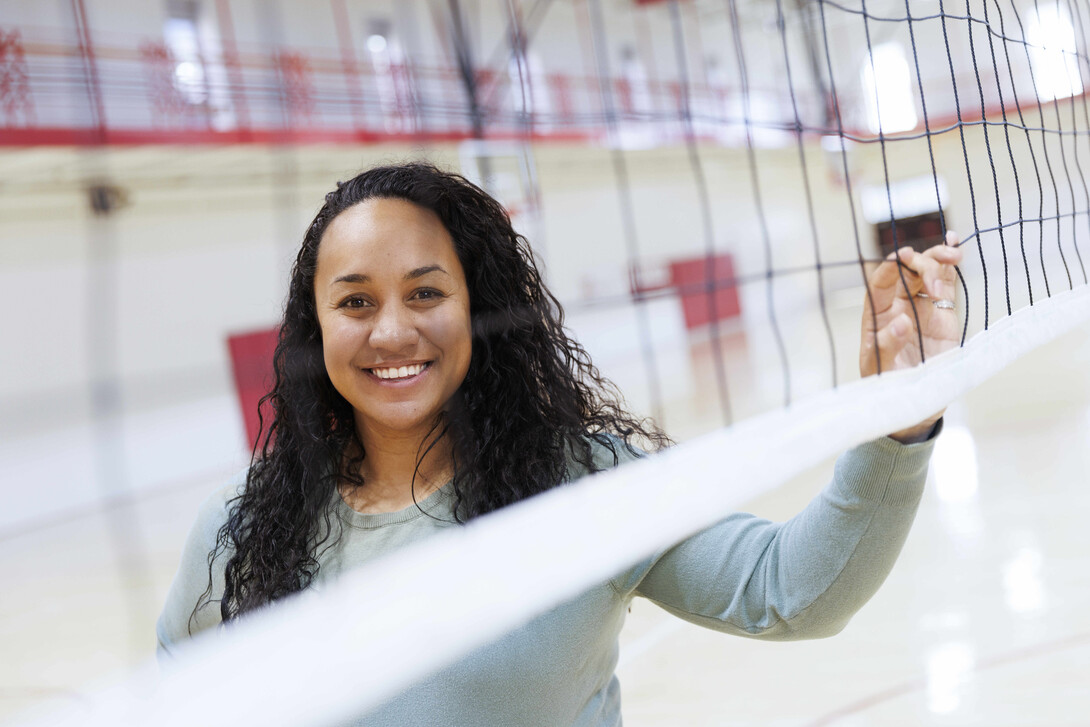
While often viewed as superhuman — achieving incredible feats of strength and stamina — athletes remain very human.
For all the moments of triumph during the 2022 Winter Olympics in Beijing, there all also moments of failure and heartbreak that test the mental health of athletes. When Team USA’s Mikaela Shiffrin, a two-time gold medalist, fell and was eliminated from her second event, the camera cut to her standing on the slope, staring in disbelief.
On campus, the University of Nebraska–Lincoln’s Mariah Bullock, athletic psychologist, works directly with Huskers. She helps student-athletes manage those moments of disappointment, which can grow into deep grief for individuals who have spent years working toward achievement on the playing field.
“It is grief,” Bullock said. “At the time (when I was playing), I don’t know how well I did it. I would do it differently now.”
Bullock is both a psychologist and an athlete, so she understands the pressures athletic pursuits can bring. A former soccer player, Bullock started the sport at age six, growing up to compete in college with Stanford’s national championship team and then professionally in the National Women’s Soccer League and the Samoa national women’s team.
After retiring from soccer, Bullock decided to pursue a doctorate in psychology in the hopes of entering the then-developing field of sports psychology. After starting her studies in clinical psychology at Brigham Young University, she connected with a sports psychologist who was able to help her hone her specialty.
“That’s when I started working with student athletes at a college level, and that’s where it kind of clicked,” Bullock said. “Where it’s like, ‘Awesome, I’m able to connect this passion and experience I had as an athlete with this new specialty area and expertise I’ve developed as a psychologist.’”
It is not always about addressing clinical psychology issues like depression and anxiety. While that is a part of Bullock’s position as a sports psychologist, she also works with athletes on sport-specific issues like performance anxiety, and mental aspects like sleep, relationships and self-talk. She’s able to apply her own experiences in her work to help Nebraska student-athletes succeed on the field and in the classroom. She draws on many of the lessons she learned on the soccer pitch.
“I tried to shrink the gravity of the moment, because I think sometimes we get very caught up in the hype around big moments,” Bullock said. “I just shrunk it back down to: it’s the game of soccer. I know how to play soccer.”
The immense pressure placed upon athletes — be it on an Olympic stage or the turf of Nebraska’s Memorial Stadium — is difficult to comprehend. For many, competing is a goal worked toward for most of their lives. According to Washington Post data, the average age of competing Olympic athletes is 27, and most Olympians begin training in the sport in some capacity during their early childhood — making the sport a life-long pursuit by the time they reach their first opening ceremony.
“I think that athletes…people treat them as superhuman, and forget how young they are,” Bullock said. “And how early they are in their development.”
Additionally, athletes are not immune to the human aspect of loss and turmoil. Shiffrin lost her father, who attended her previous Olympic games, in 2020. His passing affected her so deeply that she told “Today” she considered quitting skiing completely.
“I think it’s pretty intuitive to understand that if someone is sad or anxious, they’re not going to perform as well,” Bullock said.
Mental health in athletes is becoming a larger topic across the United States. In the past two years, greats like Simone Biles and Naomi Osaka have opened up about their own struggles and withdrawn from competitions to safeguard their mental health. While these conversations are becoming more prevalent, there is more work to be done in the sporting world — where perseverance and tenacity are purported to overcome everything.
“When I was playing, it was very much, ‘You’re tough. You show no sign of weakness,’” Bullock said. “Because when you show weakness, that is a vulnerability that allows either your coach to not trust you to perform, or that allows whoever you’re competing against to have an advantage over you.”
But vulnerabilities still exist and more athletes and teams are beginning to recognize and address them, Bullock said. She’s seen a uptick in teams and programs adding psychologists to their support networks.
For Bullock, seeing leaders like Biles and Osaka speak up about their mental health shows a promising sign for the future of athletes everywhere.
“I think it gives permission to athletes and student athletes to prioritize and be proactive about their mental health…It also gives permission to step away when it’s unhealthy either from a physical or psychological perspective,” Bullock said.







